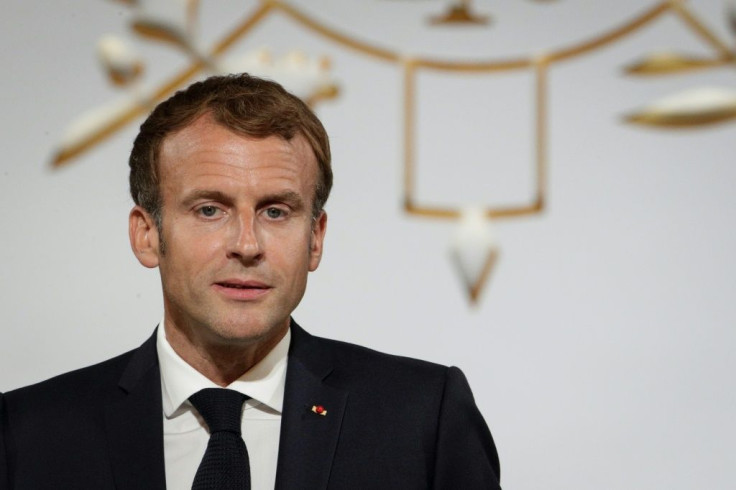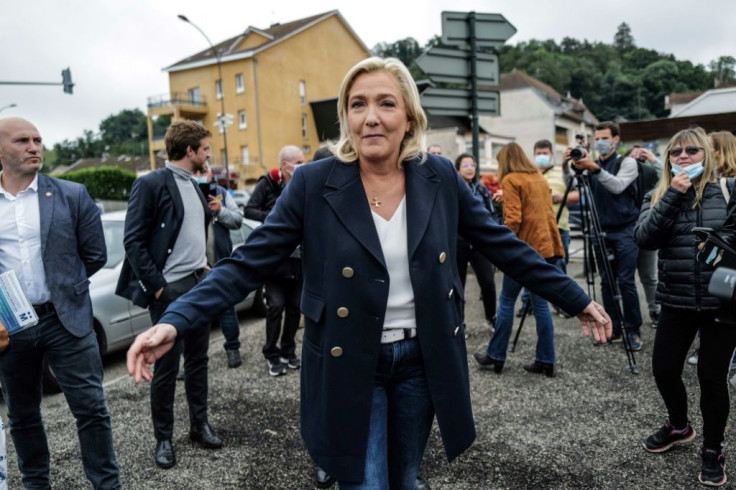Macron Walks Domestic Tightrope Over US Submarine Deal
French President Emmanuel Macron's fury over the cancellation of a huge submarine contract is part of a bid to show strong leadership in the run-up to 2022 elections, but he needs to tread carefully to avoid tripping up, analysts say.
France's unprecedented recall of its US and Australian ambassadors over the scuppering of its 31-billion-euro "deal of the century" to supply Australia with 12 submarines caught Washington and Canberra off guard.
Nearly a week after the deal was torpedoed, Macron has not yet publicly commented on Australia's decision to ditch its French order for American nuclear-powered vessels as part of a new defence pact with the US and UK to counter a rising China.

But while leaving it to Foreign Minister Jean-Yves Le Drian to complain that France had been "stabbed in the back" by its friends, it was Macron who took the decision to bring home France's envoys.
The move, usually reserved for adversaries, appeared aimed at sending a message that one of the West's biggest military powers -- which aims to be a moderating influence at a time of US-Chinese tensions in the Indo-Pacific region -- deserves more respect.
US President Joe Biden attempted to smooth the waters by requesting a telephone call with his French counterpart.
But Macron has appeared in no hurry to grant him an audience.

On Tuesday, he held talks with Indian Prime Minister Narendra Modi, where the two vowed to work together to promote stability in the Indo-Pacific area in a way that precludes "any form of hegemony."
The row comes seven months ahead of presidential elections in which the centrist Macron, who came to power in 2017 on a promise to boost France's global standing, is expected to seek a second term.

For Frederic Charillon, professor of political science at the University of Clermont Auvergne, the row is "both an opportunity and a risk" for the incumbent.
By lobbing the diplomatic equivalent of a grenade at the US and Australia, "he has sort of got his back against the wall and cannot afford to make a mistake," Charillon said.
Former president Nicolas Sarkozy, who remains highly influential among right-wing voters, on Tuesday praised Macron's handling of the crisis.
"President Macron was right to react firmly," he told reporters.

The crisis risks accentuating long-standing French fears over a loss of global influence.
An Ipsos poll published in September 2020 showed 78 percent of the France convinced their country is in decline.
On Tuesday, far-right leader Marine Le Pen, who polls show as Macron's closest rival, went on the attack over what she has called the "humiliation of France" in the Pacific, home to over a quarter of a million French citizens living on the French archipelago of New Caledonia.
"Emmanuel Macron, since the start of his term, has gone from failure to failure," said Le Pen, whom Macron defeated in 2017.
For Gilles Gressani, president of the Groupe d'Etudes Geopolitiques think tank, such showdowns with the US are "a constant feature of French foreign policy".
But even when compared with other famous transatlantic rows -- Charles de Gaulle pulled France out of NATO's military command in 1966 over what he saw as US hegemony in Europe and Jacques Chirac vetoed the US war in Iraq at the UN in 2003 -- "the intensity of (France's) reaction is striking", Gressani said.
Macron's next-closest rival after Le Pen, centre-right politician Xavier Bertrand, fumed that France was being treated "like the Americans' valet" and said Paris should consider quitting NATO's integrated command, a decade after it returned to the alliance's top table.
"In France, in this type of situation, each candidate attempts to show they are the most Gaullist," Francois Heisbourg of the Foundation for Strategic Research, told AFP, referring to De Gaulle's legacy.
Macron himself drew condemnation in 2019 for declaring that NATO was "brain dead" over the lack of coordination between the US and its allies.
Analysts say he has now put himself in a position where he cannot back down without the risk of losing face.
"If Emmanuel Macron gets something from the United States and manages to save face, the French will be grateful to him. If he gets nothing it will be detrimental to him," said Pascale Boniface, director of the French Institute for International and Strategic Affairs.
© Copyright AFP 2024. All rights reserved.





















